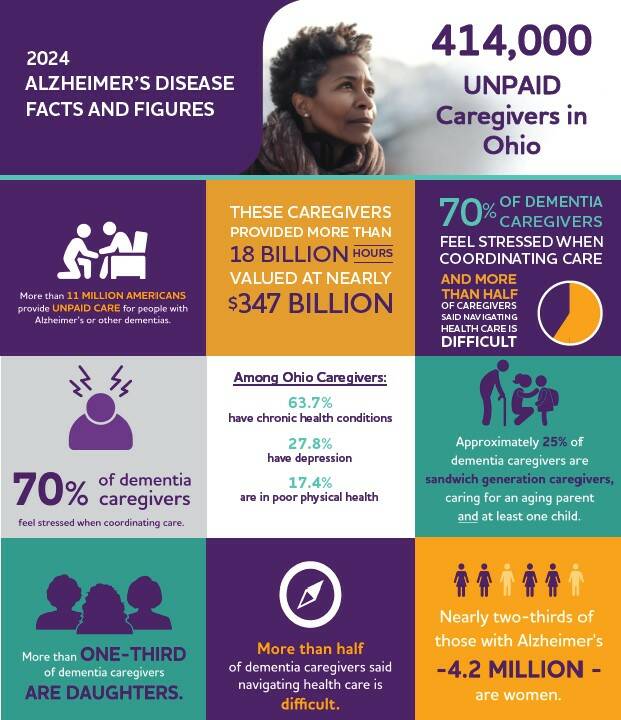
DAYTON — National Institutes of Health (NIH) observes April as National Stress Awareness Month.
Sources of stress can be as diverse as the people who undergo it, but one group that experiences stress day after day, occasionally for as long as 20 years, are the caregivers for people living with Alzheimer’s disease.
More than 414,000 Ohioans, 11.3% of the state’s population, are currently serving as unpaid caregivers for loved ones living with Alzheimer’s disease. The challenges and stress from being a dementia caregiver can be overwhelming.
According to the Alzheimer’s Association 2024 facts and figures report:
• Approximately 63.7% of Ohio caregivers have chronic health conditions;
• Caring for a spouse with dementia is associated with a 30% increase in depressive symptoms compared with spousal caregivers of partners without dementia;
• Reportedly, 70% of all dementia caregivers feel stressed when coordinating care for their loved one living with dementia.
Recognizing the signs of caregiver stress is the first step to getting help. The Alzheimer’s Association lists 10 symptoms that can help identify caregiver stress:
1)Denial about the disease and its effect on the person who has been diagnosed. “I know mom is going to get better.”
2) Anger at the person living with Alzheimer’s or frustration at their inability to do the things they used to. “He knows how to get dressed — he’s just being stubborn.”
3) Social withdrawal from friends and activities. “I don’t care about visiting with the neighbors anymore.”
4) Anxiety about the future and facing another day. “What happens when he needs more care than I can provide?”
5) Depression that breaks the spirit and ability to cope. “I just don’t care anymore.”
6) Exhaustion that makes it nearly impossible to complete necessary daily tasks. “I’m too tired for this.”
7) Sleeplessness caused by a never-ending list of concerns. “What if she wanders out of the house or falls and hurts herself?”
8) Irritability that leads to moodiness and triggers negative responses and actions. “Leave me alone!”
9) Lack of concentration that makes it difficult to perform familiar tasks. “I was so busy, I forgot my appointment.”
10) Health problems that begin to take a mental and physical toll. “I can’t remember the last time I felt good.”
Caregivers who experience any of these signs of stress on a regular basis should make time to talk to their doctor. In addition, the Alzheimer’s Association offers a number of resources through its website (www.alz.org) specifically for those providing care for loved ones with the disease:
24/7 helpline 800-272-3900
Helpful master’s-level specialists provide information, support services and referrals to caregivers, those with memory loss, health care professionals and the general public.
Care consultations
Professional staff provide coaching and support for caregivers and families throughout the dementia journey. Care consultations are provided in person or over the phone.
Community and virtual education programs
Regular programming provides comprehensive information on a variety of topics including understanding Alzheimer’s and dementia; 10 warning signs; and effective communication. To learn about programs and services near you, go to communityresourcefinder.org and search by your zip code.
Caregiver support groups
Guided by trained facilitators, support groups for caregivers meet regularly in community settings or virtually to discuss caregiver challenges and to share tips while giving and receiving support.
There are 236,200 Ohioans 65 and older living with Alzheimer’s disease, according to the Alzheimer’s Association 2024 Alzheimer’s Disease Facts and Figures. More than 4,900 Ohioans died from Alzheimer’s in 2021 (the most recent year for state-by-state data). A total of 414,000 Ohio caregivers provide 624 million hours of unpaid care each year valued at over $11.4 billion.
To learn more about Alzheimer’s or other dementia and to access free support and resources, visit alz.org/dayton or call the Miami Valley Chapter at 937-291-3332 or the 24/7 Helpline at 800-272-3900.


